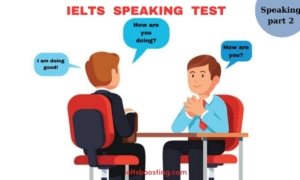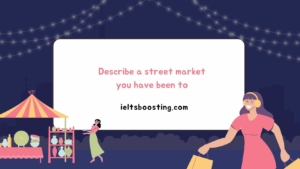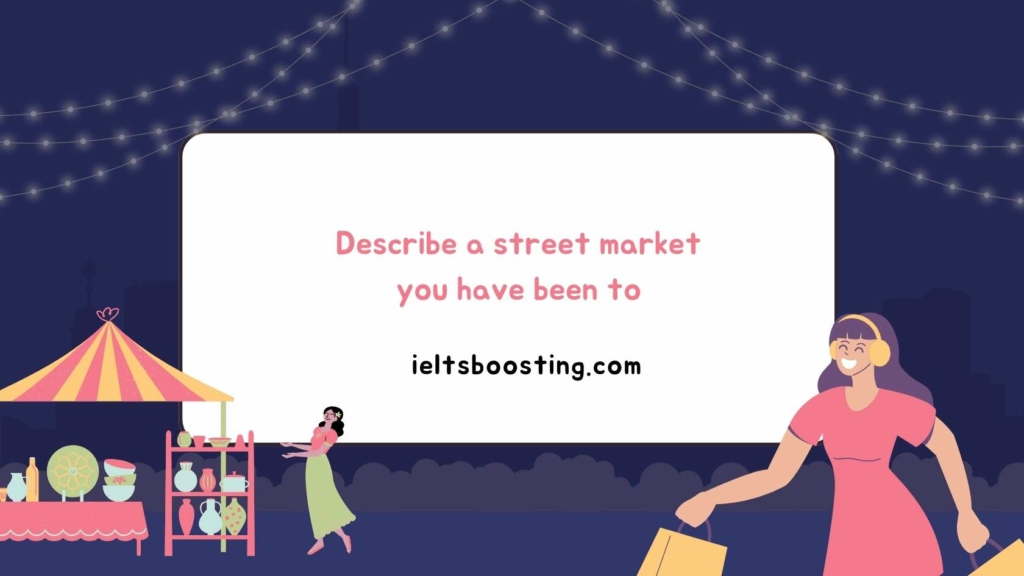Describe a street market you have been to
You should say:
Where it is
What you can buy there
Why you chose to go to this market
And explain what you think about the street market

Describe a street market you have been to
Sample answer
I would like to talk about a street market that I have been to in Vietnam. It is called Ben Thanh Market, and it is located in the center of Ho Chi Minh City, the largest and most populous city in Vietnam. Ben Thanh Market is one of the oldest and most famous markets in the city, and it has a history of more than 100 years.
I chose to visit this market because some of my Japanese friends were eager to experience the local culture and lifestyle of Ho Chi Minh City. They wanted to buy some specialties, and Ben Thanh Market is a great place to find a variety of goods, such as clothes, accessories, electronics, handicrafts, and fresh produce. The prices are very reasonable, and you can bargain with the vendors.
I think Ben Thanh Market is a very interesting and lively place to visit. It is always crowded with people, especially on weekends and holidays. You can see, hear, smell, and taste the diversity and richness of Vietnamese culture. You can also learn about the history and traditions of Ho Chi Minh City through the architecture and products of the market. Ben Thanh Market is a must-see attraction for anyone who wants to explore the authentic and vibrant side of Ho Chi Minh City.
Useful vocab
- Specialties: Unique or distinctive products that are characteristic of a particular place.
- Variety: A diverse assortment or range of different things.
- Reasonable: Fair and sensible, especially in terms of prices.
- Bargain: Negotiate the terms of a transaction, typically in relation to the price of goods.
- Crowded: Filled with a large number of people or things, densely populated.
- Diversity: The state of having a variety of different elements or qualities.
- Authentic: Genuine, true to its origins or characteristics.
- Must-see: An essential or highly recommended attraction or destination.
- Attraction: A place of interest or entertainment that draws people.
- Handicrafts: Items made by hand, often with traditional methods and skills.
- Traditions: Customs or beliefs passed down from generation to generation.
- Architecture: The design and structure of buildings or structures.
- Diversity: A range of different things or the quality of being diverse.
- Encompass: To include or contain a particular range of things.
- Vibrant: Full of energy, life, and activity.
- Sensory experience: Involving the senses, such as seeing, hearing, smelling, and tasting.
- Local culture: The customs, traditions, and way of life specific to a particular area or community.
Forecast speaking from 1-4 2024

Describe a street market you have been to
Part 3-Describe a street market you have been to
Where do people buy things?
There are different ways that people buy things, depending on what they need, where they live, and how they prefer to shop. Some people buy things from physical stores, such as supermarkets, malls, or local markets. They may enjoy browsing, comparing, or bargaining for the products they want. Other people buy things from online platforms, such as websites, apps, or social media. They may appreciate the convenience, variety, or delivery of the products they order.
Some useful vocabulary for this topic are:
- physical: relating to things that can be seen or touched
- online: connected to or available through the internet
- platform: a means of communication or expression, such as a website, newspaper, or TV channel
- browse: to look at or through something casually or without a plan
- compare: to examine or judge the similarities or differences between two or more things
- bargain: to negotiate or discuss the price or terms of something
- convenience: the quality of being easy, useful, or suitable for someone
- variety: the quality or state of having or including many different things
- delivery: the act of taking something to a person or place
Do people go to big stores or small stores more often? Why?
I think it depends on the type of product, the location, and the preference of the customer. Some people go to big stores more often because they offer a wider range of products, lower prices, and more convenience. Other people go to small stores more often because they provide more personalized service, higher quality products, and more support for the local economy. Both types of stores have their advantages and disadvantages, and customers may choose to shop at different places for different reasons.
Some useful vocabulary for this topic are:
- range: the variety or extent of something
- price: the amount of money that something costs
- convenience: the quality of being easy, useful, or suitable for someone
- personalized: made or done especially for a particular person
- quality: the standard or level of something, especially how good or bad it is
- economy: the system of production, distribution, and consumption of goods and services in a country or region
Are special services valuable to the store?
Special services are valuable to the store because they can attract more customers, increase customer satisfaction, and create a competitive advantage. For example, some stores offer free home delivery, after sales services, or loyalty programs. These services can make customers feel more valued and loyal to the store, and also differentiate the store from other retailers who do not offer such services.
Some useful vocabulary for this topic are:
- customer service: the assistance and advice provided by a company to people who buy or use its products or services
- customer loyalty: the tendency of customers to continue buying from the same company or brand
- competitive advantage: a condition or circumstance that puts a company in a favorable or superior position
- after sales service: the help and information that a company provides to customers after they have bought a product
- loyalty program: a system that rewards customers for buying products or services from the same company, usually by giving them discounts or free gifts

